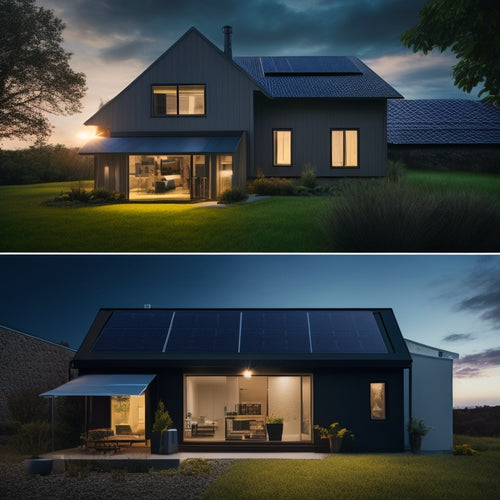
What's the Best Home Battery for Off-Grid Homes?
Share
When searching for the best home battery for your off-grid home, you'll want to evaluate factors like battery type, capacity, power output, cycle life, efficiency, warranty, and safety certifications. Lithium-ion batteries offer higher energy density and longer lifespans, but are more expensive upfront, while lead-acid batteries are cost-effective but require more maintenance. You'll also need to contemplate the cost and environmental impact of your chosen battery, as well as its integration with your solar system. By assessing these key factors, you'll be able to find the right battery for your off-grid energy needs, and access the full potential of your system.
Key Takeaways
- Lead-acid batteries are cost-effective and widely used for off-grid systems, but lithium-ion batteries offer higher energy density and longer lifespans.
- Key features to consider when selecting a home battery include capacity, power output, cycle life, efficiency, and warranty.
- The initial investment for a home battery system can range from $5,000 to $15,000, but long-term savings and incentives can reduce costs.
- Environmental impact is a crucial consideration, with lithium-ion batteries having a lower carbon footprint and recyclability benefits compared to lead-acid batteries.
- Compatibility with solar systems and real-time monitoring capabilities are essential for maximizing energy harvesting and storage in off-grid homes.
Top Home Battery Brands
When searching for the best home battery for your off-grid home, selecting a reliable brand is vital.
You'll want to take into account top brands like Tesla, SimpliPhi, and LG Chem, which have established themselves through rigorous brand comparisons and performance reviews.
Tesla's Powerwall, for instance, is known for its sleek design and high energy density, while SimpliPhi's batteries boast a long lifespan and low maintenance.
LG Chem, on the other hand, offers a range of options with varying capacities and voltages.
When exploring these options, it's important to evaluate brand reputation and take into account factors like warranty periods, maintenance requirements, and performance in harsh conditions.
By examining these brands' features, warranty periods, and customer support, you can make an informed decision that meets your off-grid energy needs.
Look for brands with a proven track record, and don't be afraid to dig into the technical specifications to find the best fit for your home.
Best Battery Types for Off-Grid
You'll need to evaluate three primary battery types for your off-grid home: deep cycle options that provide a steady flow of energy over an extended period, particularly suitable for solar applications solar energy storage due to their ability to withstand repeated charging and discharging.
They offer a consistent energy supply and differ from regular batteries.
Lead-acid batteries offer a cost-effective solution with some limitations, and lithium-ion batteries boast high efficiency and long lifetimes.
Each type has its advantages and disadvantages, which you'll need to weigh carefully to make an informed decision.
Deep Cycle Options
Several deep cycle battery types are well-suited for off-grid homes, each with its unique characteristics, advantages, and disadvantages.
You'll need to weigh factors like battery chemistry, discharge rates, and lifespan to choose the right one for your needs.
Flooded lead-acid batteries, for instance, offer high reliability and low upfront costs but require regular maintenance.
Sealed lead-acid batteries, on the other hand, are maintenance-free but have lower cycle lives.
Lithium-ion batteries boast high energy density and long lifetimes but come with higher price tags.
As you evaluate these options, think about your energy usage patterns, budget, and maintenance preferences to select the best deep cycle battery for your off-grid home.
Lead-Acid Batteries Explained
Lead-acid batteries have been a staple in off-grid energy systems for decades, and their popularity stems from their affordability, reliability, and widespread availability.
You'll find them in many off-grid homes due to their well-established manufacturing process and economies of scale. The lead acid chemistry involves a reaction between lead dioxide and sulfuric acid to produce electricity.
As you consider lead-acid batteries for your off-grid home, keep in mind their lifespan, which typically ranges from 5 to 15 years, depending on the quality of the battery and how well you maintain it.
While they're a cost-effective option, their weight, size, and maintenance requirements are essential factors to weigh in your decision.
Lithium-Ion Advantages
Lithium-ion batteries have been gaining traction as a preferred choice for off-grid homes, and for good reason.
You'll appreciate their high energy density, which allows them to store more power in a smaller footprint. This means you can generate and store more energy with fewer batteries, saving you space and money.
Lithium-ion batteries also boast advanced safety features, such as built-in protection from overcharging and overheating, giving you peace of mind.
Plus, they've a lower environmental impact compared to lead-acid batteries, producing less waste and toxicity.
With a longer lifespan and lower maintenance requirements, lithium-ion batteries are an attractive option for off-grid homeowners seeking reliable, efficient, and eco-friendly energy storage solutions.
Key Battery Features to Consider
When selecting a home battery for your off-grid home, you'll want to evaluate several key features to guarantee you get the right one for your needs.
Battery safety is a top priority, so look for certifications like UL 2271 and compliance with national electrical codes.
You'll also want to take into account the environmental impact of your battery, including its recyclability and the sustainability of its manufacturing process.
Additionally, take into account the energy storage capacity and backup capabilities of the battery, such as automatic switch to backup power during grid outages, to guarantee uninterrupted supply.
Other essential features include a battery management system (BMS) to monitor performance and prevent overcharging, as well as a durable enclosure that can withstand outdoor conditions.
Additionally, take into account the compatibility of your battery with your existing off-grid system and the level of customer support offered by the manufacturer.
Battery Capacity and Cycle Life
You'll need to carefully consider two critical aspects of your home battery's performance: its capacity and cycle life.
Capacity measures the amount of energy your battery can store, usually expressed in kilowatt-hours (kWh). A higher capacity means more power for your off-grid home.
Cycle life, on the other hand, refers to the number of charge and discharge cycles a battery can handle before its capacity starts to degrade. Look for a battery with a high cycle life to guarantee it lasts for years to come.
Additionally, consider a battery's efficiency and charging speed to maximize your energy harvest. A battery with high efficiency and fast charging capabilities will help you make the most of your renewable energy sources.
Cost and Maintenance Factors
Frequently, the cost of a home battery system is a significant factor in the decision-making process for off-grid homeowners.
You'll want to take into account not only the upfront cost of the battery itself but also installation costs, which can vary depending on the complexity of the installation and the location of your home.
Be certain to also factor in warranty options, which can provide peace of mind and protect your investment. Some manufacturers offer extended warranty options, which can cover parts and labor for up to 10 years or more.
Additionally, you'll want to take into account ongoing maintenance costs, such as periodic inspections and software updates, to guarantee your system operates at peak efficiency.
Integration With Solar Systems
As you weigh the cost and maintenance factors of a home battery system, it's equally important to contemplate how seamlessly it integrates with your solar system.
You'll want to verify your battery is compatible with your existing solar setup to maximize energy harvesting and storage.
Some key considerations for integration include:
-
Solar compatibility: Does the battery system support your solar panel configuration, and can it optimize energy production and storage?
-
System scalability: Can the battery system adapt to changes in your energy needs or solar array size?
-
Real-time monitoring: Does the system provide real-time monitoring and control of your solar and battery performance to optimize energy usage?
Frequently Asked Questions
Can I Use a Home Battery as a Generator Replacement?
You're not alone in wondering if a home battery can replace a generator - a million times yes! But, realistically, it depends on your energy needs. A battery's longevity and a generator's efficiency are vital elements to evaluate before making the switch, so crunch the numbers carefully.
Are Home Batteries Compatible With Wind Turbines?
When you're considering wind turbine integration, you'll find that many home batteries are compatible, ensuring efficient energy storage. Look for batteries with built-in inverters and charge controllers, which optimize wind turbine compatibility and energy storage efficiency, allowing you to utilize power effectively.
Do Home Batteries Require Special Installation Permits?
Like a medieval knight preparing for battle, you'll need to gear up with permits before installing a home battery. You'll require compliance with installation regulations and adherence to safety standards to guarantee a hazard-free setup, so don't skip this vital step.
Can I Add More Batteries to My System in the Future?
You can easily expand your energy storage capacity by adding more batteries to your system in the future, thanks to flexible battery expansion options that cater to your growing future energy needs.
Are Home Batteries Prone to Overheating or Fires?
You're right to worry about overheating and fires; however, most home batteries have built-in safety features, such as thermal management systems, to prevent these issues, ensuring battery safety and minimizing risks through advanced temperature control and monitoring.
Related Posts
-

Is Switching to Green Energy Solutions Easy
Switching to green energy solutions isn't just easy; it's also beneficial. You can greatly cut utility costs and enjo...
-

Solar Powered Lights for Sustainable Home Decor
Solar-powered lights offer a stylish and eco-friendly way to enhance your home decor. They capture sunlight, converti...
-

Cost of Home Solar Battery
You're looking to invest in a home solar battery to reduce your grid reliance, but you're curious about the cost. The...


